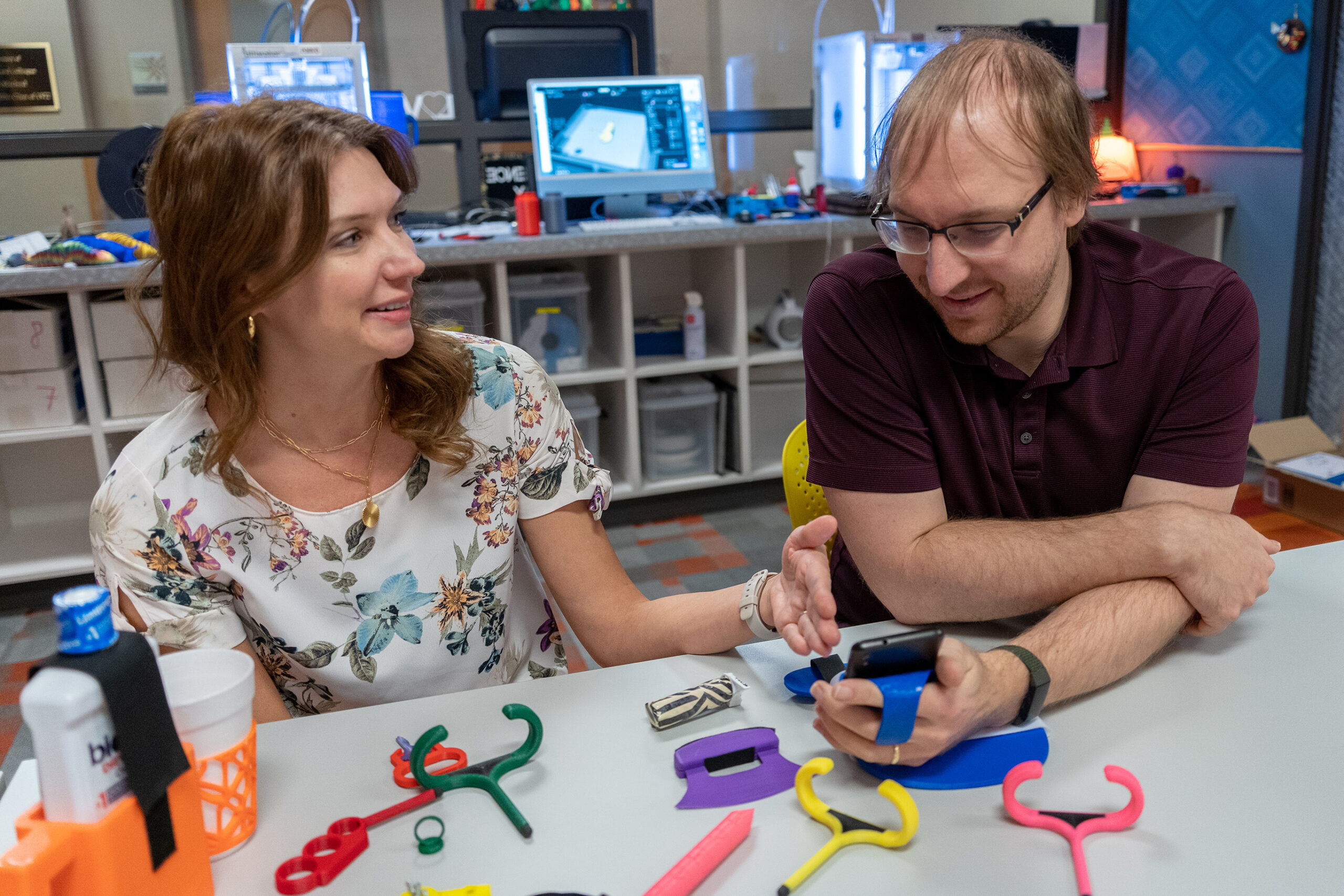
Sara Benham, assistant professor of occupational therapy, and Jeffrey Bush, assistant professor of computer science and head of the 3D printing lab, have been awarded a grant to develop an app for the disability community.
By Meghan Decker Szvetecz ’08
For a person living with a disability, access to everyday assistive devices can make all the difference in increasing independence and quality of life. A mouthwash holder for an easier pour, a stylus to type on a smartphone, a dibber to plant flower bulbs–small, handheld devices such as these can be fabricated by a 3D printer in a matter of hours, from plastic filament that costs anywhere from a few cents to a few dollars. Devices are often not covered by health insurance and it’s up to the person with a disability to source and pay for them. No easy feat when that person must cull through the 3D design files available on makerspace websites that include everything from fidget spinners to cosplay props.
Enter 3D Adapt: the app being developed by Sara Benham, assistant professor of occupational therapy, and Jeffrey Bush, assistant professor of computer science and head of the 3D printing lab, with help from students across majors.
As co-managers of the partnership between Moravian University and Good Shepherd Rehabilitation Health Network, the pair have been combining Benham’s occupational therapy background and Bush’s 3D design experience for the last three years to print customized assistive devices for patients. Creating an app together became the logical solution to the many barriers Benham and Bush identified to device access. Partly supported by a grant from the App Factory to Support Health and Function of People with Disabilities,* 3D Adapt will feature an accessible interface and a simple database of well-curated devices.
It is geared exclusively to people living with a disability and the clinicians who assist them. Users can download an assistive device design file and take it to a publicly accessible 3D printer (at a library, for example) or have their device printed and shipped by a 3D printing service.
The market for assistive devices is big. According to the 2020 U.S. Census Bureau, more than 40 million Americans live with a disability. Globally, more than one billion individuals need at least one assistive technology device.
Benham is currently organizing their database and tagging devices for the appropriate categories and subcategories. “I’m working on the best way to categorize each of these devices based on the World Health Organization’s International Classification of Functioning, Disability and Health so that it’s better used widely through all clinical professions,” says Benham, who hopes that the app can serve as a platform where individuals with a disability can collaborate with their clinicians. When the app is published this fall it will feature 10 to 20 customizable models and 200 models that will not be customizable.
What made their grant proposal stand out, they learned, was the fact that their app can be produced entirely at Moravian, resulting in a lean budget of just under $29,000. Rather than hiring an app developer, Bush recruited senior Shane Houghton, a computer science and graphic design double-major, to write code for the app. Bush says that Houghton is excited to be “making something that will actually be published, people will actually use, and he’s going to be helping people.”
Grant funding will also be allocated to graphic design students from Studio South, and when the app is functional this summer, occupational therapy students can participate in focus groups. “We really want to involve as much of the Moravian community in all of this as possible,” says Bush.
Part of the grant proposal includes promoting their project at an upcoming conference and publishing a peer-reviewed paper. Bush will also write a business plan for how the app can sustain itself and cover the cost of hosting. With future funding, Benham sees so much potential for this project to grow and evolve, she says. “I think that the opportunities will turn into more opportunities for students. We’re bringing all of the talents of our faculty and students together.”
*Funded by a grant from the National Institute on Disability, Independent Living and Rehabilitation Research (NIDILRR) in the U.S. Department of Health and Human Services to the Shepherd Center (Grant # 90DPHF0004)